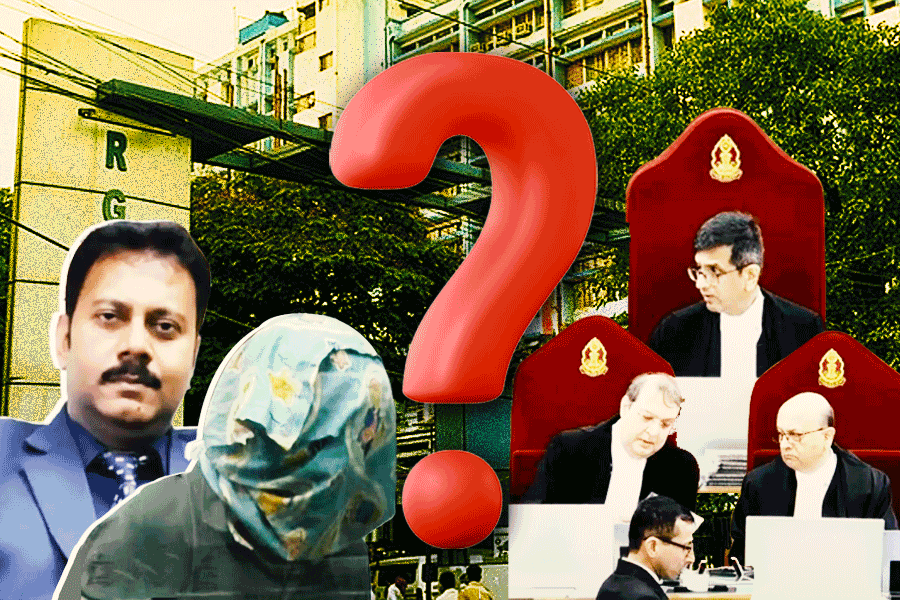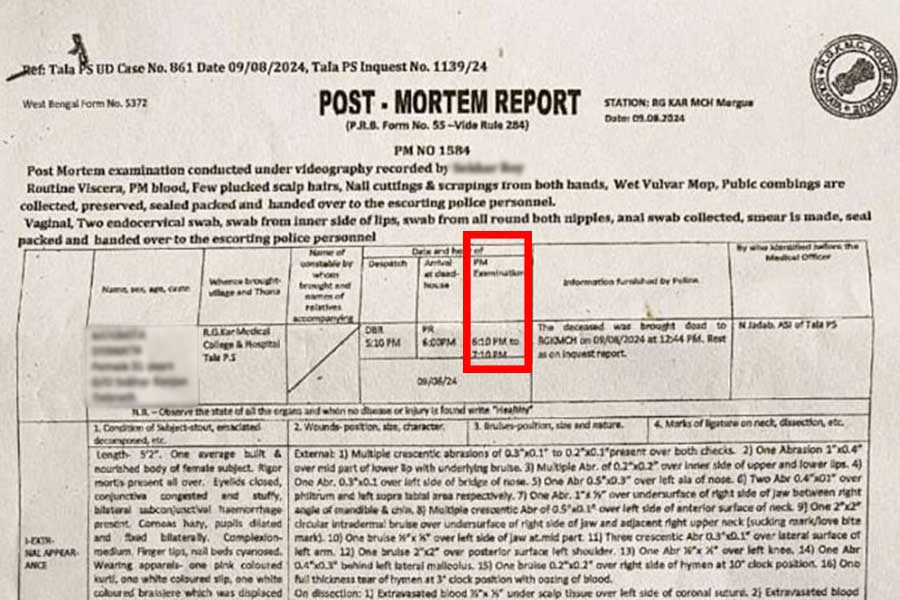The RG Kar Medical College and Hospital rape and murder case keeps getting murkier.
On Thursday, the three-judge bench of the Supreme Court led by Chief Justice of India DY Chandrachud along with Justice J.B. Pardiwala and Justice Manoj Misra had pointed questions for Kapil Sibal, who is leading the battery of 21 lawyers the Bengal government has deployed for the case in the apex court.
When exactly was the unnatural death case lodged, when was the FIR lodged and when was the post-mortem conducted?
“Mr Sibal, one aspect is extremely disturbing,” CJI Chandrachud said during the course of the hearing, the second after the court took up the case suo motu (on its own).
“The GD [General Diary] entry of death is recorded at 10.10 am. The securing of the crime scene, the seizures etc was done at 11.30 at night? What was happening all by then?” asked the CJI.
Sibal denied the state of Bengal had done anything wrong.
The state counsel has been insisting that the government and police followed all the procedures regarding the investigation “to the T”.
But even after Thursday’s hearing, the timeline of Calcutta’s most heinous crime in recent memory is not clear. The CBI is saying something, the Bengal government and its police are saying something else.
At the first hearing on Tuesday, Sibal had told the Supreme Court bench the time of the post-mortem examination was between 1 pm and 4.45 pm. The Telegraph Online on Wednesday had pointed out that Sibal’s statement and the time mentioned in the post-mortem report (6.10 pm to 7.10 pm) did not match.
On Thursday, Sibal told the Supreme Court that the post-mortem was conducted between 6.10 pm and 7.10 pm.
The debate over when the complaint was lodged, why the post-mortem and the cremation of the victim was carried out before the FIR was registered has not yet been settled.
According to the FIR that the victim’s father had lodged close to midnight on August 9, almost 14 hours after the body was found at the seminar hall of the chest department on the third floor of the emergency building, the family of the victim was informed their daughter was unwell an hour after the first GD entry was made.
“This morning around 11.15 am, I received a call on my mobile phone from someone in the hospital saying that my daughter had taken ill,” said the FIR, written in Bengali, a copy of which The Telegraph Online has seen.
“I reached the hospital as soon as I could and was taken to the third floor where the seminar hall is located. The place was swarming with cops, doctors and her classmates,” the FIR added.
Soon after the incident, several photographs and videos of the victim had been shared on social media and reached the inboxes of some individuals through instant messaging services.
The seizure list – of all the victim's belongings and other objects found near the body – prepared by the Tala police station states the time as between 8.30 pm and 10.45 pm.
Many questions, one big question mark
Ten days after the CBI was entrusted with the investigation of the case following a Calcutta high court order, many questions related to the case remain unanswered. Who saw the body first? Why were the parents told their daughter was unwell and later told she had died by suicide?
The CBI has visited the RG Kar Medical College and Hospital many times. It has interrogated the former principal Sandip Ghosh for the last six days, along with several other of his former colleagues including the head of the chest department and the former vice principal.
The CBI has also requested permission for a polygraph (lie-detector) test on Ghosh. The CJI on Thursday ordered the additional chief judicial magistrate of Sealdah court to give its order on the request by 5pm Friday.
During Tuesday’s hearing at the apex court, Sibal kept saying, “This is not an adversarial matter.”
Two days later, when the state along with the CBI submitted two separate status reports, Sibal said the questions over the timeline of events are attempts to “muddy the waters”.
To that, the solicitor general Tushar Mehta, representing the CBI, said: “We are trying to take the mud out of the water.”
The biggest question is, who is muddying the water?
When Sibal repeated that the Calcutta police had followed the prescribed regulations, the CJI commented: “But that doesn’t justify the registration of the FIR at 11.30 pm. Body was recovered at 9.30 am. What is the reason (a) for FIR to be lodged 14 hours of delay; (b) the principal of the college should come to the college straightaway and file the FIR? Whom is he protecting? (c) he had resigned and is appointed principal of another college?”
Ghosh was sent on leave by the Calcutta high court.
“After post-mortem and inquest, the body is handed over to mother, after return to the police station a UD case is registered. All police superior [officers] were informed. It appears that initial report of UD was received and registered at 10.10 am. After they returned to the police station at night FIR recorded at 11.30 in the night,” the CJI observed. “If police say GD 861 was recorded at night, how does the inquest report refer to the UD [unnatural death] earlier than that?”
Justice Pardiwala also questioned the role of the assistant superintendent of the RG Kar Medical College and Hospital.
“The entire procedure followed by your state is something which I have not come across in the 30 years of my… the first thing, is it true that the UD was recorded at 10.30 hours? Second, who is this assistant superintendent? Is she non-medical? Her conduct is also very doubtful, why did she act in this manner?” Justice Pardiwala asked Sibal.
The bench also directed Sibal to ensure the presence of a “responsible police officer who can answer” the questions from the bench.
Net result, 13 days after a government doctor on duty was raped and murdered in the capital of Bengal, two versions of the truth are in sealed envelopes with the Supreme Court.
And no one knows who is muddying the water.












